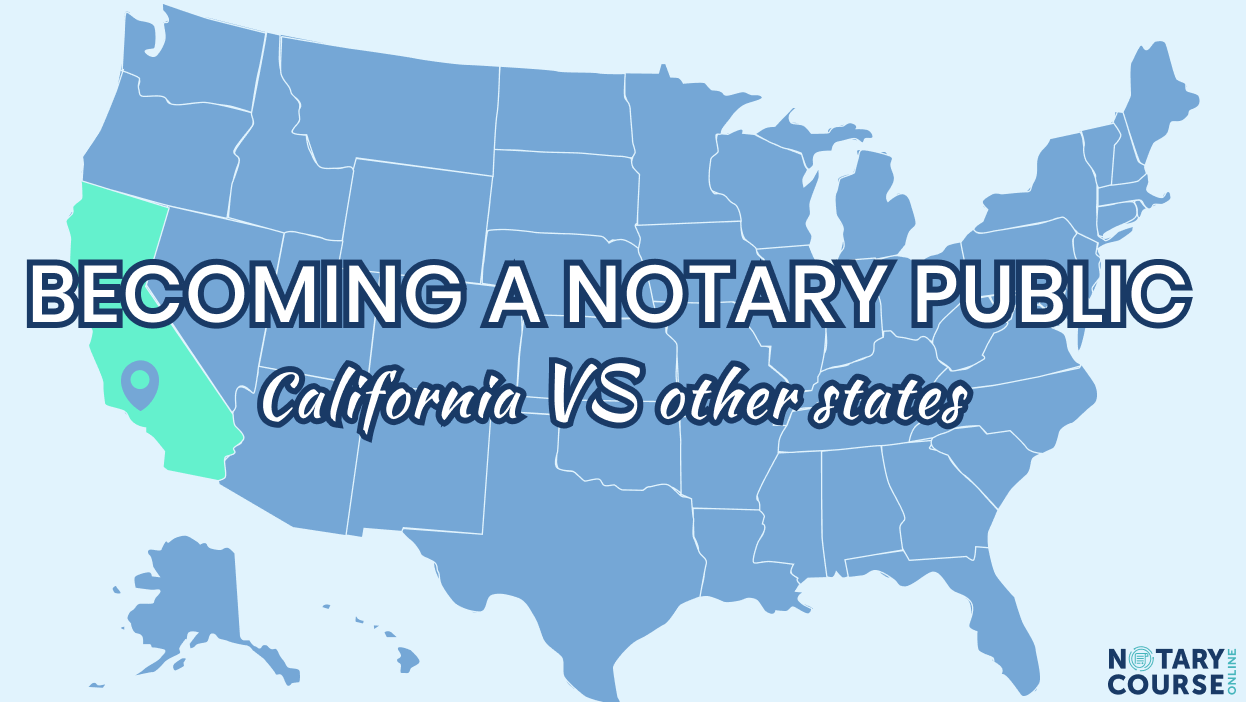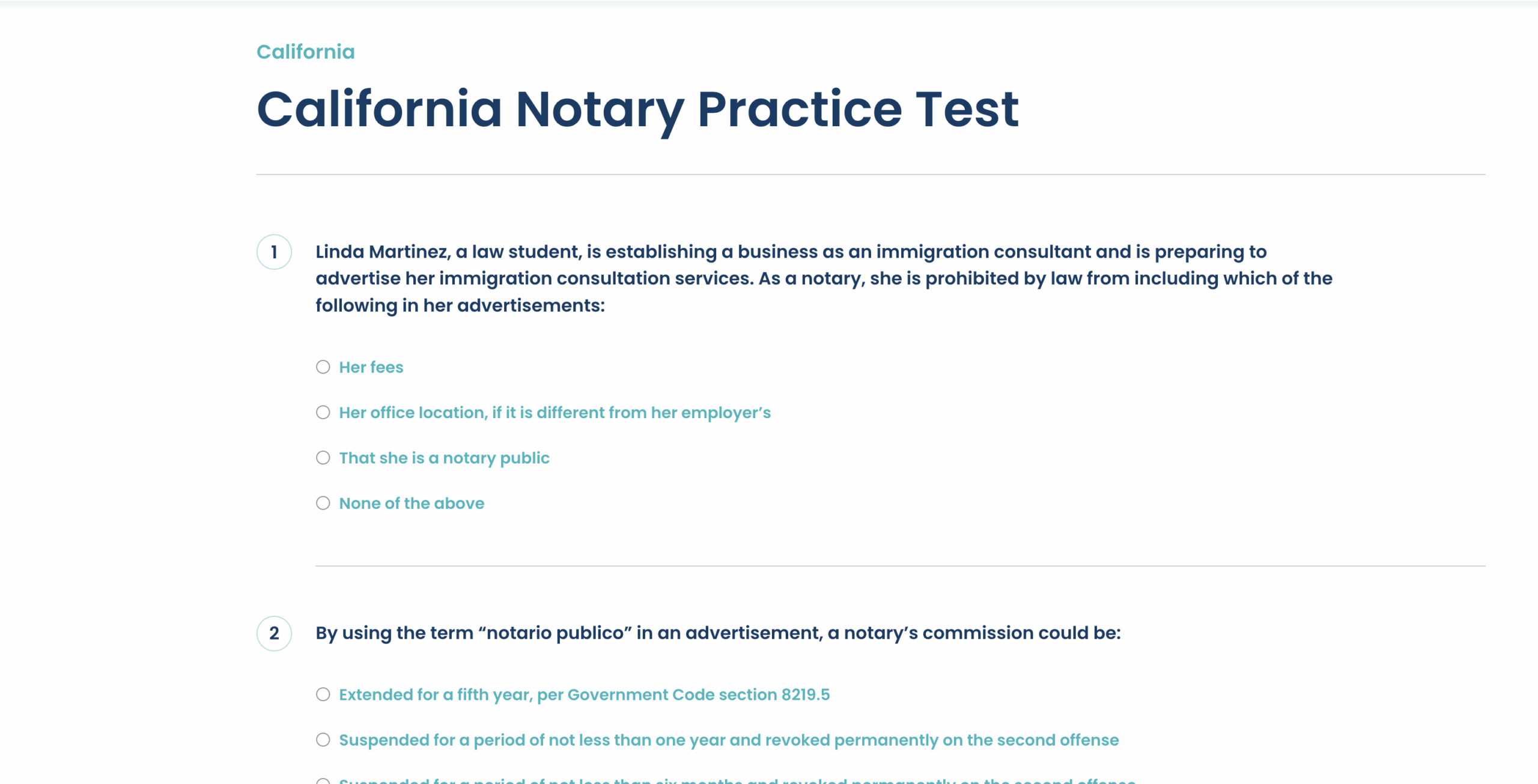California
Blog
California Notary Application Process

-
by Notary Course Online
- September 9, 2024
Introduction
Navigating the California Notary Application Process can seem intimidating, but it’s actually a well-organized and simple process. Becoming a Notary Public in California opens doors to performing essential legal duties such as witnessing signatures, administering oaths, and preventing fraud—vital functions in real estate transactions, legal documents, and other official proceedings.
The journey to becoming a Notary Public involves meeting specific qualifications, completing required education, passing an exam, and undergoing a background check. Common misconceptions include the belief that U.S. citizenship is mandatory or that any criminal record automatically disqualifies you. Understanding these nuances ensures a smoother application process.
This guide aims to break down each step and clarify requirements for aspiring notaries in California. Our goal is to provide you with the necessary knowledge to successfully obtain your commission.
What You’ll Learn In this guide, we’ll cover:
- The importance of being steady and ready for the responsibilities ahead.
- The essential California notary supplies needed for the job.
- Specific regulations regarding notarizing documents for family members in California.
By understanding these key aspects, you’ll be better prepared for your journey as a Notary Public in California.
Understanding Notary Public Qualifications and Requirements
When considering becoming a Notary Public in California, it’s crucial to understand the specific qualifications and requirements set forth by the state. These guidelines ensure that candidates are adequately prepared and eligible for the responsibilities of the office.
Age and Residency Requirements for Applicants
- Minimum Age: You must be at least 18 years old to apply for a Notary Public commission in California.
- Residency: A notary public appointed in California must be a resident of California at the time of appointment. .
Legal Status and Citizenship Considerations
- U.S. Citizenship: While U.S. citizenship is not a requirement you must be a legal resident of the State of California; (notaries appointed on military bases must be U.S. citizens.
- Legal Status Documentation: If you are not a U.S. citizen, ensure you have the necessary legal documentation to support your residency status.
Criminal Record Disclosures and Their Implications
- Disclosure Requirement: Full disclosure of any criminal convictions is mandatory when applying. This includes all felonies and misdemeanors, regardless of whether they were expunged or occurred in another state.
- Impact on Application: Certain convictions may lead to denial of your application. It’s important to be transparent about your criminal history as the Secretary of State’s office reviews each case individually to assess eligibility.
Note: A revoked notary commission may also affect your eligibility when reapplying.
Understanding these notary public qualifications ensures that you meet all criteria before starting the application process. This preparation helps avoid potential delays or disqualifications, setting you on a clear path toward becoming a Notary Public in California.
However, even after meeting all these qualifications, it’s essential to remember that there can still be unforeseen issues during the application process. Therefore, it’s advisable to double-check then triple-check all your information and documents before submission to ensure a smooth process.
The Step-by-Step Notary Application Process
- Initial Preparation
Taking the first steps toward becoming a notary public in California requires careful preparation. This phase is crucial for ensuring a smooth application process and avoiding common pitfalls.
Visiting the Secretary of State’s Website for Resources
Your journey begins by visiting the California Secretary of State’s website. Here, you will find an extensive range of resources designed to guide you through each step of the process. These resources include:
- Detailed instructions on completing your application.
- Information on required documentation.
- Guidelines for meeting educational requirements.
Utilize these resources as your primary reference point throughout your application journey.
Enrolling in an Approved Notary Education Course
The state mandates that all prospective notaries complete a six-hour notary education course. This training ensures you understand the duties and responsibilities associated with being a notary public in California. When selecting a course, consider:
- Approved Providers: Ensure the course is approved by the California Secretary of State.
- Format: Choose between online self-paced courses or traditional classroom settings based on your learning preference.
- Cost: Compare prices as they can vary, but generally expect to pay around $40 for online courses.
Approved providers include offerings such as California Approved Notary Course Online https://notarycourseonline.com/(License: #607657) which provide a comprehensive curriculum and are designed to help you ace the notary exam.
In addition to completing your education, it’s also important to gather the necessary supplies for your notary practice. You can find high-quality California notary supplies at Notary Course Online, which offers essential items such as seals and journals.
Being well-prepared during this initial phase sets a solid foundation for successfully navigating the California Notary Application Process. The next critical step involves completing your mandatory education and taking the notary public exam.
- Completing Required Education and Taking the Notary Public Exam
To become a notary public in California, completing a mandatory 6-hour training course is essential. This course, recognized by the California Secretary of State, covers vital topics such as notarial acts, ethics, and state-specific regulations.
Options for Training Courses:
- Online Courses: Offer flexibility and self-paced learning. Examples include platforms like California Approved Notary Course Online https://notarycourseonline.com, which provides both 3-hour (for renewals) and 6-hour courses with instant proof of completion.
- In-Person Courses: Structured sessions offering direct interaction with instructors. These might be available through local community colleges or professional training centers.
Registration Process for the Exam:
- Complete the Training Course: Obtain a certificate of completion.
- Visit the California Secretary of State Website: Register for the notary public exam via their online portal.
- Schedule Your Exam: Choose from various locations and dates that fit your schedule.
For those looking to prepare effectively for the exam, here are some tips:
- Study Materials: Utilize practice tests, PDF workbooks, and timed lessons provided by approved education providers.
- Review Key Concepts: Focus on understanding notarial laws, procedures, and ethical guidelines.
- Practice Consistently: Regularly take mock exams to build confidence and familiarity with the exam format.
Passing this exam is a critical step in your California notary application checklist and ensures you are well-prepared to fulfill your duties as a notary public. For additional insights on notary public tips, consider exploring resources available online.
- Submitting Your Application at the examination site
Submitting your application involves several steps:
- Gather Required Documents: Ensure you have all necessary documents, including proof of completion of your notary public education course.
- Complete the Application Form: Fill out the application form available on the California Secretary of State website
.3. Submit Your Application: Bring your completed application form along with any required fees to the exam site.
- Livescan Fingerprinting and
Livescan fingerprinting is a crucial step in the California Notary Application Process. It’s essential for conducting a thorough background check, ensuring that applicants meet the state’s legal standards.
Importance of Fingerprinting
Livescan fingerprinting helps verify your identity and check for any criminal history. This process protects the public by ensuring that only qualified individuals are granted notary commissions.
Locations and Costs
- Locations: Livescan services are available at various locations such as police departments, sheriff’s offices, and private businesses. You can find a comprehensive list on the California Secretary of State website.
- Costs: The cost typically ranges from $20 to $30 for the service fee, plus additional fees for processing by the Department of Justice and FBI.
Timeline Expectations
- Processing Time: After submission, expect a processing time that can vary from a few weeks to several weeks depending on workload.
- Status Updates: You can check the status of your application on the California Secretary of State website.
By following these steps diligently, you ensure a smooth progression through the California Notary Application Process.
Final Steps to Obtain Your Notary Commission
Awaiting Your Commission Packet from the State
Once you have submitted your application and completed the Livescan fingerprinting, you will need to wait for your commission packet from the California Secretary of State. This packet includes:
- Your official notary commission certificate
- Instructions on taking your oath of office
- Bond filing requirements
The timeline for receiving this packet can vary, but it is advisable to keep an eye out for any notifications or updates from the Secretary of State’s office.
Filing Your Oath of Office and Bond Within 30 Days
Upon receiving your commission packet, you must file your oath of office and a $15,000 surety bond with your county clerk’s office within 30 days. Missing this deadline can result in delays or even the need to restart the process. The filing process typically involves:
- Visiting the County Clerk’s Office: Locate your nearest county clerk’s office.
- Filing the Oath and Bond: Submit the necessary documents as instructed in your commission packet.
- Paying Filing Fees: Be prepared to pay any associated filing fees.
Surety Bond Requirements and Purchasing Notary Supplies
Understanding the $15,000 Surety Bond Requirement
California requires a $15,000 surety bond as part of becoming a notary public. This bond serves as a financial guarantee that protects the public from potential misconduct or errors by notaries. While this bond does not protect you directly, it ensures that any claims against you are financially covered up to $15,000. However, notaries can still be found financially responsible to reimburse their bonding company.
Estimating Costs Related to Bonding and Supplies
Costs can vary based on providers, but here are some general estimates:
- Surety Bond: Typically ranges between $38-$50 for a four-year term.
- Notary Supplies: Essential items include:
○ Notary Public Journal: Around $20-$30
○ Notary Public Seal: Approximately $20-$40 depending on customizations
○ Miscellaneous Supplies: Stamp ink pads, notarial certificates, etc., which may add up to about $10-$20.
Essential Supplies Needed for Practice as a Notary Public in California
To effectively carry out your duties as a notary public in California, certain supplies are indispensable:
- Notary Public Journal: A sequential journal is required by law to log all notarizations.
- Notary Public Seal: Must be obtained from an authorized manufacturer and used on all notarized documents.
- Notarial Certificates: Preprinted forms that comply with state requirements for various types of notarizations such as Acknowledgements and Jurats.
- Ink Pads and Pens: Quality ink pads for stamping and reliable pens for signing documents.
By ensuring you have all these items ready before starting your practice, you adhere to legal requirements while setting yourself up for a smooth notarial practice.
This checklist will help you stay organized and compliant with state regulations during the final steps of obtaining your notary commission.
If you’re unsure about where to find a notary near you, there are resources available online that can assist you.
For more insights into notarial practice, including news and tips, check out our notary public blog.
Maintaining Your Notary Commission and Continuing Education Requirements
Keeping your notary commission in California requires ongoing attention to renewal timelines and continuing education requirements. Here’s what you need to know:
Renewal Process
- Notaries must renew their commission every four years.
- Renewal applications should be submitted before the current commission expires to avoid gaps in authorization.
- Missing the renewal deadline means starting the process from scratch, including taking the mandatory 6-hour course and passing the state exam.
Continuing Education
- Existing notaries must complete a 3-hour refresher course approved by the Secretary of State.
- This course covers updates in notary laws and best practices.
- Proof of completion is required when submitting your renewal application.
Re-examination
- Notaries must pass a new examination administered by an approved vendor to renew their commission.
- Regularly updating your knowledge ensures compliance with state laws and maintains professional standards.
Staying proactive about these requirements helps ensure seamless continuation of your notary services. However, mobile notaries face unique challenges, such as managing varying client locations and adapting to different legal requirements across regions. Therefore, understanding location-specific nuances is crucial for mobile notaries to provide effective services while maintaining compliance with state laws.
Resources for Aspiring Notaries
Online Courses and Materials
If you’re aiming to become a notary in California, there are many online courses available that are approved by the California Secretary of State. These courses are specifically designed to help you meet the mandatory education requirements and prepare for the notary public exam. You can explore some of these online courses that offer comprehensive learning materials.
Course Features and Benefits
- Self-Paced Learning: The courses offer a self-paced format, allowing you to study at your convenience. This flexibility is ideal for individuals with busy schedules or those who prefer to learn at their own pace.
- Comprehensive Materials: The online materials include timed lessons, a PDF workbook, and practice tests with over 140 questions. These resources ensure that you have all the information needed to succeed. For instance, you can access practice tests that simulate the actual exam environment.
- Instant Proof of Completion: Upon finishing the course, you receive immediate proof of completion, which is required for taking the state exam.
- Long-Term Access: Most courses provide 12 months of access, giving you ample time to review materials as needed.
- Affordable Pricing: Prices for these courses are reasonable, typically around $39.99 for the 6-hour training and $29.99 for the 3-hour renewal course.
Advantages of Taking Online Courses
Taking an online course offers several advantages:
- Convenience: Study from anywhere without the need to attend physical classes.
- Flexibility: Adjust your study schedule to fit your personal and professional commitments.
- Immediate Feedback: Online platforms often offer instant feedback on practice tests, helping you identify areas where more study is needed.
Testimonials from Successful Students
Many students have praised these online courses for their effectiveness:
“The self-paced format was perfect for my busy schedule. I felt fully prepared for the exam and passed on my first try!” — Jane D.
“The comprehensive materials and practice tests were incredibly helpful. I highly recommend these courses to anyone looking to become a notary in California.” — John S.
Choosing an online course that is approved by the California Secretary of State ensures that you receive quality education tailored to meet all state requirements.
With positive reviews on trust-img and other platforms, these courses offer a reliable pathway to becoming a notary public in California.
By utilizing these resources, aspiring notaries can efficiently navigate the California Notary Application Process with confidence and ease.
The combination of structured learning materials, flexible scheduling options, and supportive community feedback makes these online courses an excellent choice for your notary education needs.
In addition to online courses, understanding certain practical aspects such as the guidelines for disciplinary actions can be beneficial for new notaries.
Moreover, having access to essential tools like a Jurat certificate, which simplifies adding a Jurat to notarized documents, can significantly enhance your efficiency as a notary public.
Conclusion
Becoming a Notary Public in California has many benefits and opportunities. It’s crucial to understand the California Notary Application Process and meet all qualifications to begin this rewarding journey.
- Becoming a notary enhances your professional credentials.
- It provides a valuable service to your community.
- Ensures legal documents are properly executed.
By following the steps on how to become a notary in California, you can navigate this process with confidence and ease.
Frequently Asked Questions
What is the step-by-step process for applying to be a Notary Public in California?
The application process involves several steps: First, prepare by visiting the California Secretary of State's website and enrolling in an approved notary education course. Next, complete the required education and pass the Notary Public exam and submit your application. Then, undergo Livescan fingerprinting. Finally, file your oath of office and bond to obtain your commission.
How important is Livescan fingerprinting in the Notary application process?
Livescan fingerprinting is a crucial part of the Notary application process as it helps verify the applicant's identity and check for any criminal history. The locations and costs associated with Livescan services can vary, so it's important to plan accordingly.
What are the continuing education requirements for renewing a Notary license in California?
Notaries in California must renew their licenses periodically, which includes completing refresher courses and potentially re-examination if necessary. Staying updated on laws and practices is essential for maintaining an active Notary license.
What supplies do I need to practice as a Notary Public in California?
As a Notary Public in California, you will need essential supplies such as a notary public journal to record transactions, a notary public seal for authenticating documents, and surety bond coverage of $15,000 as required by law.
Are there online courses available for aspiring Notaries in California?
Yes, there are self-paced online courses approved by the California Secretary of State that aspiring Notaries can take. These courses offer flexibility and often receive positive reviews from students who have successfully completed them.






 Congratulations!
Congratulations!